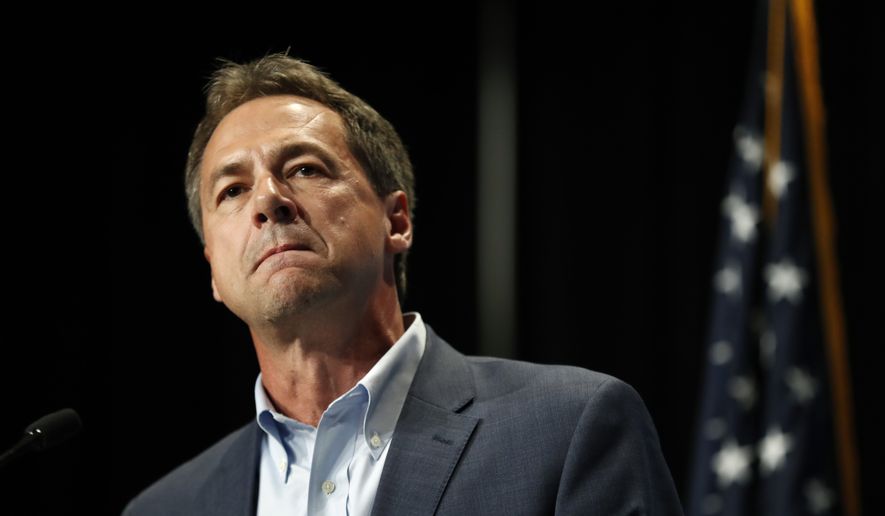Candidates who didn’t qualify for the Democrats’ opening presidential debate next week are trying to turn their failure into an opportunity, using the snubs to rally supporters and cast themselves as agents of change in a broken process.
Montana Gov. Steve Bullock says he’ll be in Iowa and New Hampshire next Wednesday and Thursday, holding town halls in the hours before the debate, hoping to grab some attention away from the debaters.
“I’ve won in a Trump state because I’ve showed up and listened to voters where they are. And that’s exactly what I’ll do at these town halls and for the next 230 days until the first voters express their preference,” Mr. Bullock said Tuesday.
Rep. Seth Moulton of Massachusetts, also left off the debate stage, will nevertheless be in Miami, scene of the 20-person affair. He’s hoping to piggyback on the expected press frenzy surrounding the debate.
“It’s a simple fact that there’s going to be a lot of people there from the media who’ve asked to speak to me,” he told Fox News.
Also planning to be in Miami is Wayne Messam, mayor of Miramar, Florida, and another long-shot candidate who didn’t qualify under the Democratic National Committee’s rules.
“Tell me what have others done over me to earn a spotlight in front of millions to gain name recognition and donors?” he tweeted Tuesday. “Have they beat out China for Jobs? Have they passed a living wage? Are they suing their state and gun lobby? I have and am doing.”
With such a massive field of candidates eager to challenge President Trump, the DNC said it would schedule two days for its first sanctioned debate.
To qualify, candidates had to prove they received contributions from at least 65,000 donors, including at least 200 from 20 states, or hit 1% in three qualifying polls. The 20 candidates to clear the bar were granted spaces, divided over the two nights.
The end result is that elected officials like Mr. Bullock and Mr. Moulton, who got into the race relatively late, won’t be on stage, while candidates like self-help guru Marianne Williamson and entrepreneur Andrew Yang will get a chance to tangle directly with the likes of former Vice President Joseph R. Biden and Sen. Bernard Sanders.
“People are pissed, and they should be, and I know Gov. Bullock feels the same way,” Mr. Moulton said in an interview with WKXL radio in New Hampshire published this week. “I think Gov. Bullock and I are two of the people who are really strong candidates in the places that we need to flip in order to take back the White House.”
His campaign said that last Friday, the day after the DNC announced the debate lineups without him, was their best fundraising day since his campaign launch.
While chafing against their exclusion, the candidates are already eyeing the second debate, to be held in Michigan at the end of July.
The campaign of former Sen. Mike Gravel of Alaska said he still plans to qualify for that debate.
The DNC says anyone can qualify, and the Bullock campaign Tuesday said he’s now registering 1% support in an Iowa poll released over the weekend, meaning he’s eligible — though with the stage still limited to 20 candidates, that doesn’t yet mean he’s officially earned a spot on stage.
“The DNC could still try to limit how many candidates are on stage at the second debate. We could be forced off the stage again!” his campaign said in a fundraising email Tuesday.
• David Sherfinski can be reached at dsherfinski@washingtontimes.com.




Please read our comment policy before commenting.